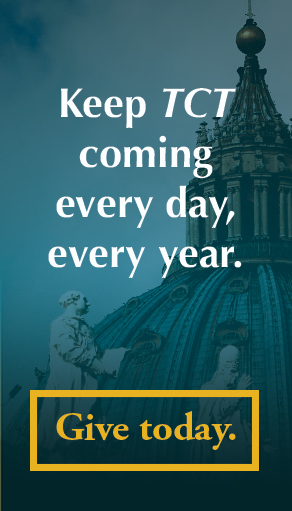Since we are in the period between Easter and Pentecost, many of the readings at Mass are from the Acts of the Apostles and deal with the early Church. These readings express how the apostles powerfully carried on the work with which they were entrusted by Christ, faithfully fulfilling it by handing on what they themselves had received “from the lips of Christ, from living with Him, and from what He did, or what they had learned through the prompting of the Holy Spirit.”
And so the apostolic preaching, which is expressed in a special way in the inspired books, was to be preserved by an unending succession of preachers until the end of time. Therefore, the Apostles, handing on what they themselves had received, warn the faithful to hold fast to the traditions which they have learned either by word of mouth or by letter, and to fight in defense of the faith handed on once and for all. (Cf. Dei Verbum 7-8.)
We look back to this period with special reverence because of the intimacy the apostles shared with Christ. And the Church, which traces its origins to those apostolic roots, must remind itself continually of its mandate to “hold fast” to the tradition handed on to us.
There is also, I would add, a remarkable genius we find among these apostolic fathers – a genius that was a special gift of the Holy Spirit, certainly, but was nonetheless expressed and embodied in human “earthen vessels.” That inspired genius was “expressed in a special way in the inspired books” – the Scriptures – but also in their way of life and the way in which they organized their affairs in the early Church. And so the Church survived and expanded, despite persecution.
We find a particular example of that genius in this reading above from the Acts of the Apostles:
The Twelve called together the community of the disciples and said,
“It is not right for us to neglect the word of God to serve at table.
Brothers, select from among you seven reputable men,
filled with the Spirit and wisdom,
whom we shall appoint to this task,
whereas we shall devote ourselves to prayer
and to the ministry of the word.” (Acts 6:1-4)
The apostles appointed deacons to help with some practical matters so they could devote themselves to prayer and the ministry of the word. A lot of the common sense in this arrangement seems lost on us today.
One conclusion from this story might have been: Gee, what a good idea! We train priests to preach the word and teach the faith. But too often they have too little time for those things because they’re busy with those things we don’t train them to do, like pay bills, pave the parking lot, raise money, and arrange meetings. So, wisdom would seem to dictate that we need deacons or something like them, to do these things to free up priests so that they can devote themselves to prayer and the ministry of the word.

But instead of service, the diaconate is now regarded by some in terms of its status, and forcing the Church to allow women deacons is the wedge they want to use to get women into the priesthood. That effort is bound up with a larger project of putting certain people into positions of power within the ecclesiastical “pecking order.” Sadly, experience shows that the people who want those positions are usually the last people in the world you would want running anything.
This problem is related to one of the tragic misunderstandings of the Second Vatican Council’s teaching on the laity. The Council called laypeople to holiness in their own domain. Service to the Church happens when laypeople have families, do their jobs faithfully, and care for their neighbors. We still have people who think “service to the Church” means “getting involved” at church, especially in running the liturgy. Instead of realizing that the specifically lay vocation takes place outside the church, in the world, these people make a mad rush for the altar to do things the priest normally does. Not only is this a misunderstanding of the lay vocation, it causes other, more serious problems.
When you get laypeople doing things priests should be doing, as though that’s what the Council meant by “lay involvement,” then these same people want authority over a whole host of things, including Church doctrine. Since most laypeople are out living their Christian vocations at work, in their families, and neighborhoods, they don’t have time for these little ecclesiastical squabbles over where the tabernacle should be placed or whether there should be altar girls. So those decisions are sometimes left in the hands of many people who are the last people in the world you want running anything.
This seems to be the case with the German “synodal way.” People with actual jobs and families can’t spend all their time devoted to such institutional navel-gazing. So it’s left to bourgeois Catholics with money and time at their disposal, who are more interested in institutional power than in Christ, to go to the endless meetings and bang out the pointless documents filled with meaningless gibberish. Nothing could be further from the letter and spirit of the Second Vatican Council. But then, such affairs have little to do with fidelity to the apostolic tradition; they are about the institutional pecking order and the will to power.
An old joke goes: “In the beginning, Christ established the hierarchy and thus did more than enough for the Church until the end of time.” Tinkering with the arrangement of that hierarchy seems to be the obsession of many “progressives.” To some of us, this seems like dithering over the arrangement of the deck chairs on the Titanic. It takes a special kind of bureaucrat to resolve, as the ship sinks and the cold seawater rises to your chin, that what is most needed now is yet another committee meeting.
















